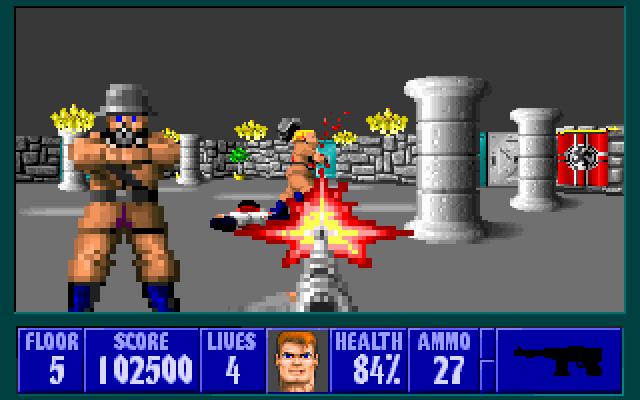
Editor's note: Developers intend first-person games to imitate the way we experience our own lives, right? Unfortunately, the only means of interaction in these titles is via the barrel of a gun. Jon chose to question this convention and concluded with some eerie suggestions. Is the genre doomed? -Omar
The first time I killed a nazi was in my middle-school typing class. I don't remember how my fellow student found and loaded Wolfenstein 3D onto our computer. All I remember is staring at the screen and watching him mow down pixilated soldiers. My 12-year-old psyche inflamed in primitive bloodlust with every downed corpse. Despite the distraction, I somehow still learned to type, which was a good thing since Doom was a year away. QWERTY was no match for the BFG.
Clearly, first-person shooters offer something primal and unique: the illusion of carrying weaponry and blasting foes before your very eyes. But why must we exclusively tote guns? How else might we harness the innate strengths of first-person immersion? In writing, a first-person narrator can tell any kind of story: family drama, crime thriller, quirky romance, or even a children's fable. But today we rarely see genres other than shooters use this point-of-view. Such wasn't always the case.
Early RPGs like Dungeon Master used the first-person perspective to envelop us in an underground world of fantasy more effectively. Jumping Flash! put you in the shoes (and behind the eyes) of a robotic rabbit, leaping around a technicolor playground. The technology of CD-ROM and polygonal environments provided game makers with the storage space and graphical fidelity to explore new ways of controlling one's character, a feat early games couldn't pull off. But the experiment was short-lived. By the mid-90s, Doom and its progenitors would dominate the use of first-person in a trend that has yet to fade.

Exceptions do exist. Portal looks like a modern FPS but it's more of a first-person puzzler. Curiously, your mode of action is still shooting a gun. Mirror's Edge gave us the modern first-person platformer along with an exhilarating experience. Unfortunately, while it was fun, Mirror's Edge's failure among critics is indicative of why more run-and-jump games don't use this perspective.
Maybe the limited range of precision that occurs when you're thrust into a protagonist's body damns the first-person to an eternity of shooters. But then again, maybe not. At times, playability has nothing to do with it. When games give us the option of a first-person camera, many of us prefer it to over-the-shoulder perspectives. When I first played Star Fox on my SNES, I zoomed in to the cockpit mode and shot down asteroids from the vantage point provided by the Arwing's window. I missed the feeling of motion I got while watching those graceful barrel rolls from behind my ship.
Perhaps we experience games in first person regardless of our onscreen perspective. Espen Aarseth, notable game scholar, expresses something close to omniscience in describing how he perceives Lara Croft while playing Tomb Raider, "When I play, I don't even see her body, but see through it and past it." In essence, Aarseth creates his own first-person point-of-view, regardless of the visual data. Doom wowed us with an early taste of character identification that was visceral and immediate. You weren't controlling a space marine because you were the space marine. Unfortunately, 21st-century minds crave more immersion. We are well versed in avatar theory and project an endless series of selves through online symbols and pseudonyms. What once felt vibrant and new — holding a fake gun in a fake world — now feels like just another empty shell.

I don't dislike first-person shooters. I'm just not interested in them. Maybe it's the glut of testosterone-filled battles that have dulled my senses through oversaturation. Take me someplace other than Gritty War-torn Valley #27. Give me something else to do other than duck, cover, and shoot. With the proliferation of shooters at this year's E3, a backlash is inevitable. Flood the market and you risk drowning. My question is what new idea will cut through the smog of gunpowder and give players that thrill they first felt while roaming corridors in search of pixelated demons, some twenty years ago. After decades of feeding our id, perhaps our rational selves deserve some playtime.

